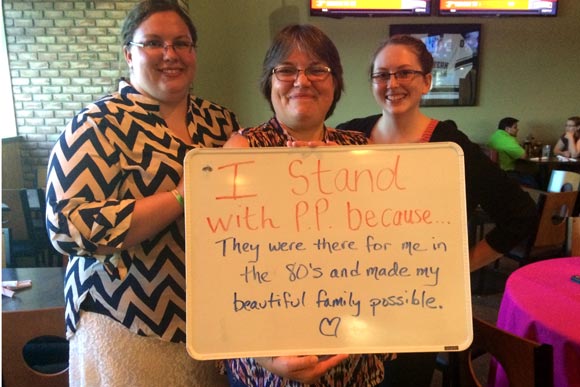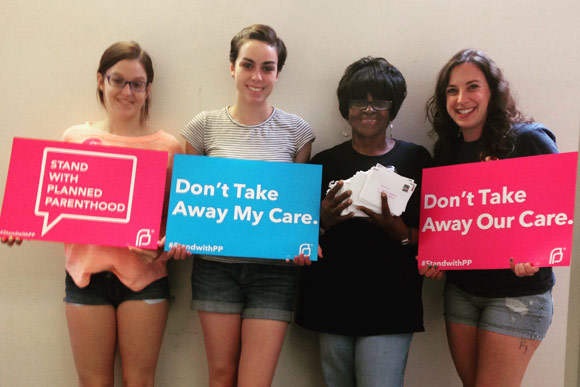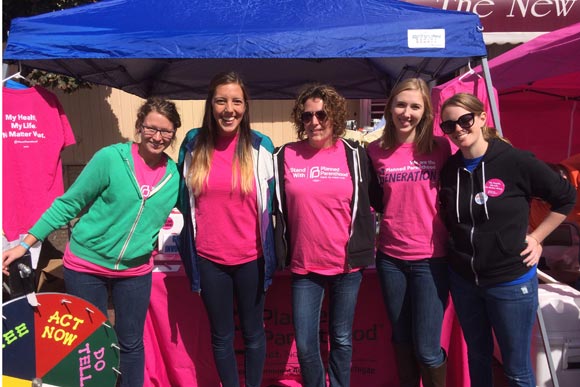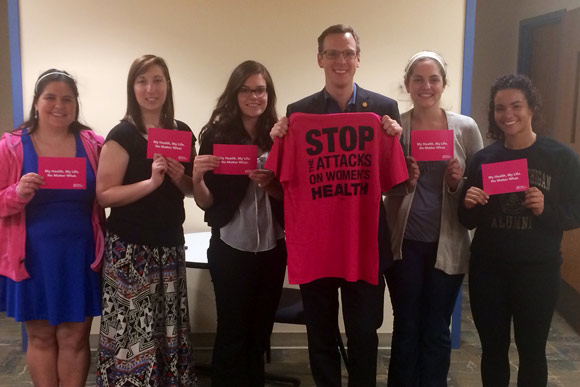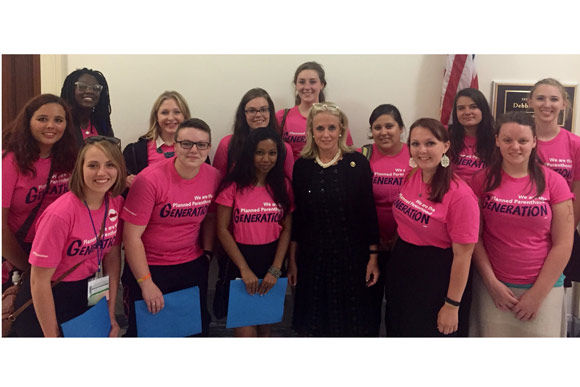The Planned Parenthood Attacks: When stigma and shame define women’s healthcare
As legislators in the nation's capital scrap over the $500 million in federal funds that represents 40 percent of the monies that keep Planned Parenthood in business, local women talk about their gratitude for the variety of services they receive there.
This past summer a fake biomedical research company called Biomax Procurement Services released a series of videos. The company started by David Daleiden, who is also the founder of the anti-abortion organization Center for Medical Progress, staged and recorded conversations between actors posing as research facility employees and Planned Parenthood representatives. The highly edited videos purport to show Planned Parenthood selling fetal tissue for profit.
Donating fetal tissue for medical research is legal, but profiting from its sale is not. Jenny Kinne of Planned Parenthood Advocates of Michigan says that Michigan does not currently participate in tissue donation, and “Planned Parenthood closely follows the code of the law, and these videos are a corrupted attempt to close our doors.”
She is corroborated by an independent report, which found that, “A thorough review of these videos in consultation with qualified experts found that they do not present a complete or accurate record of the events they purport to depict.”
But that didn’t matter.
The damage to public opinion had already been done, and the ball had already been picked up by Republicans in Congress. Their plan? Completely defund, or take away federal dollars for Planned Parenthood.
Planned Parenthood is funded in a variety of ways–Kinne says that private donors make up a large portion of their budget, but Planned Parenthood relies heavily on federal grants for preventative health care and education services.
Planned Parenthood offers a full range of sexuality education and reproductive health care services–mostly to un- and under-insured people. Their services include birth control, sexually transmitted infection testing, cancer screenings, pregnancy testing and counseling, well-woman exams, prenatal care, and vasectomies. And while most clinics provide abortion care, only 3 percent of Planned Parenthood’s collective services are abortion-related services, and, thanks to the Hyde Amendment, federal funds are already prohibited from being used for abortions at Planned Parenthood. This is what makes a legislative attack to defund the nation’s largest provider of reproductive healthcare services for women so insidious.
And also nothing new.
Which is why, in addition to the range of healthcare services that Planned Parenthood offers, they also have an advocacy arm, devoted, in its entirety, to defending Planned Parenthood on the legislative front in order to ensure that women and families can have access to the services they need.
Attacks on women mean the need for full-time advocacy
As the full-time West Michigan Field Organizer for Planned Parenthood Advocates of Michigan (PPAM), Kinne holds a unique perspective on the impact that legal, political, and personal attacks have on clinics, employees, and patients. She says:
“In all 50 states across the country, abortion providers have been under political attack. Legislation has sought to make abortion inaccessible and/or illegal. Similar legislation has gone after emergency contraception and comprehensive sex education. In extreme cases, legislation is also slashing access to birth control, cancer screenings, and STI testing. At the national level, we have seen attacks on birth control/abortion coverage in insurance policies, funding for Planned Parenthood’s preventative services, and more. It has gone as far as it can go – with legislators threatening to shut down the federal government if the budget includes Planned Parenthood.”
(On Sept. 24, the Senate rejected the bill that would have defunded Planned Parenthood in the face of a threatened government shutdown. A new short-term spending bill was quickly introduced in its stead in an attempt to avert a shutdown. The proposed bill maintains funds for Planned Parenthood and will be voted on this week.)
In addition to the political lobbying against abortion and Planned Parenthood, there are the protesters who stand outside of clinics across the country. They have become the 40-year-long embodiment of what Kinne refers to as “America’s current culture war.”
According to NARAL Pro-Choice America, “Since 1993, eight clinic workers–including four doctors, two clinic employees, a clinic escort, and a security guard–have been murdered in the United States.” And, “between 1977 and 2009, at least 41 bombings, 175 arsons, 96 attempted bombings and arsons, and 642 bomb threats have been directed at abortion providers.” Kalamazoo’s Planned Parenthood clinic is among those arson statistics. In 1986, an arson destroyed the clinic, resulting in $750,000 in damage. Kinne says it was a very stressful time in the clinic’s history and donors came through to help the clinic get back on its feet.
The anti-choice vigilantes are not just extremists. They represent significant financial and social power that is concentrated behind large and powerful anti-choice groups, like Right to Life and Live Action. Their sole end-goal is to criminalize abortion and shut down Planned Parenthood. “At the end of the day, these groups are bent on controlling sexuality (with an emphasis on women’s sexuality),” Kinne says.
The patients of Planned Parenthood
While Planned Parenthood serves all genders with a variety of services, it is women who use and need their services the most. In fact, 1 in 5 U.S. women will use the services of Planned Parenthood at some point in her lifetime. Their reasons and needs are vast.
Jill, a mother of one in her early 40s, was in a committed, monogamous relationship when she opted for an IUD. Her regular physician’s office referred her to Planned Parenthood because, although she had excellent insurance for most other things, an IUD was not a covered birth control option. Planned Parenthood could offer the same contraception at less than half the cost. During the educational counseling she received about the IUD at the clinic, Jill learned more about how the IUD worked and decided against it after all, but was grateful for the full information they offered and the options she learned she had.
Ruth’s husband learned that his doctor preferred to have spousal consent before performing a vasectomy. Instead, he went to Planned Parenthood, because they didn’t ask for spousal consent. “As a feminist he felt strongly that neither spouse should need the other spouse’s permission for sterilization,” Ruth says. She also used Planned Parenthood as a young woman and a woman new to several towns. She found she could easily get an appointment at Planned Parenthood, that it had an amazing staff, and its nurse practitioners inspired her to work in women’s healthcare. “Their teaching and kindness were wonderful at any age.”
Kerry (not her real name) used Planned Parenthood when she was in college and still under her parent’s health care plan. She needed discreet and anonymous access to birth control and STD testing. Kerry also went to Planned Parenthood for education, support and treatment when she was diagnosed with HPV. “I was pretty scared and feeling angry with myself at the time. The staff and nurses there were so incredibly helpful in supporting me at such a tender time.”
Rachel (not her real name) found out she was six weeks pregnant, and for medical reasons, she immediately considered terminating. “I called my OB-GYN, with whom I’d delivered my younger son two years previous. It had been a very positive experience and I had always received good care from him and his nurses. I knew he was a Christian, as he had a Bible in the waiting room, but it’s not like it ever came up. I called the office and said I was pregnant and wanted to discuss termination with the doctor. The office manager said the doctor would not even be willing to discuss the issue with me. That was it. She hung up. I was horrified with shame and so scared when I called Planned Parenthood and asked if someone would talk to me about my options. Of course, they responded calmly, kindly, and with the utmost professionalism. I will never stop feeling grateful for the compassion they showed me. It took many visits before I was ready to terminate, at 8 weeks. I strongly believe any support for Planned Parenthood needs to not be apologist in nature. Planned Parenthood provides abortions, and I for one am SO grateful they do.”
Heather used Planned Parenthood for well-woman care and birth control for the many years when she was uninsured. It wasn’t until she obtained an abortion from them and endured the clinic protesters that her reliance and appreciation for Planned Parenthood’s services turned to action. “Seeing those protesters makes me angry, but more fired-up than anything. They encourage me to share my story and tell people why reproductive rights are important.”
Effects on healthcare employees
For the healthcare practitioners working in the clinics, the effects of trying to meet the needs of the community while simultaneously battling attacks is both logistical and emotional.
“Logistically, practitioners are at the whims of lawmakers as legislation is passed that makes day-to-day operations at health centers more complicated,” Kinne says. “Since laws are regularly changing, our practitioners need to learn new processes quickly with the understanding that, out of any other health care providers, they are under the highest levels of scrutiny. Additionally, our facilities are under constant threat. In 2011, an omnibus anti-abortion bill shut down numerous abortion providers while causing others to undergo millions of dollars’-worth of unnecessary construction.”
On the emotional side, when one walks into a clinic that is crowded, under construction, and plagued by protesters, the stress levels are high. “The everyday life of our staff is oftentimes thankless. Imagine driving to your job, having protesters scream at you and thrust graphic pictures in your face, and going straight into seeing patients,” Kinne says. “Our employees provide difficult services already, and laws that make our operations more complicated while supporting a culture of hate take an emotional toll on us all.”
The real risks in defunding women’s healthcare
Millions of women depend on Planned Parenthood for things like cancer screenings and well visits. Defunding Planned Parenthood would place countless lives at risk. Some people would forgo preventative care and birth control, some would not receive early diagnoses that could save their lives, and others would be forced to carry pregnancies or seek out unsafe terminations.
At least half of American women will experience an unintended pregnancy by age 45, and at 2008 abortion rates, one in 10 women will have an abortion by age 20, one in four by age 30 and three in 10 by age 45. Abortion is not only legal, but one of the safest medical procedures when it is readily accessible, and when it is performed by a physician. Kinne says, “We know what happens when safe and legal abortion goes away. Millions of women die.” She says that Planned Parenthood is dedicated to never going back to the days of back-alley abortions “when women were maimed and killed in an effort to control their own reproduction.”
The commonality in the stories from those who seek care at Planned Parenthood is relief and gratitude for a place that offers competent and compassionate care without judgment. For women, especially, a safe space can be hard to come by in a culture that is committed to denying them their autonomy. For women, the message delivered through policy and public opinion that they don’t deserve choices takes a toll. Kinne says, “At the end of the day, this means that women in Michigan and across the country are struggling to survive. Many women come to our clinics desperate, not knowing where else to turn. Our lawmakers are working to create a world in which women cannot take control of their own reproductive lives. This will result in unhealthy communities.”
Planned Parenthood Advocates of Michigan is always seeking support. You can check out its website for information on how to be involved.
Kathi Valeii is a writer, speaker, and activist living in Kalamazoo. She writes about gender-based oppression and full spectrum reproductive rights at her blog, birthanarchy.com.
*Some names have been changed for privacy and safety.

